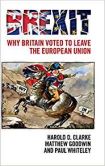Brexit: Why Britain Voted to Leave the European Union by Harold D Clarke, Matthew Goodwin and Paul Whiteley
| Brexit: Why Britain Voted to Leave the European Union by Harold D Clarke, Matthew Goodwin and Paul Whiteley | |
|
| |
| Category: Politics and Society | |
| Reviewer: Sue Magee | |
| Summary: Not a book of opinions about why the United Kingdom voted to leave the European Union but a close look at what the statistics tell us. It's a dry but informative read. | |
| Buy? Maybe | Borrow? Yes |
| Pages: 250 | Date: April 2017 |
| Publisher: Cambridge University Press | |
| ISBN: 978-1107150720 | |
|
| |
Ten, nearly eleven months on from the June 2016 referendum I'm still struggling to come to terms with the thought that the United Kingdom voted by a narrow but decisive majority to leave the European Union. Since then I've been searching for enlightenment in the form of hard facts rather than opinions: given a handful of people you'll get at least half a dozen 'valid' reasons. Personally, I blame Boris Johnson. Brexit: Why Britain Voted to Leave the European Union isn't a book of opinions about why the United Kingdom voted to leave the European Union but a close look at what the statistics tell us. It's a dry but informative read.
The referendum marked the culmination of trends which had been building for decades - arguably since the last referendum on the subject in June 1975. In the time since the last referendum we've struggled with an opposition party in Parliament which is far from being as effective as it might (and should) be and the Scottish National Party is using the result to further their own independence-related aims. UKIP is struggling to prove that it still has a reason to exist. As I write we're mere weeks away from a General Election, which could well give the Prime Minister the majority she needs to push through her own agenda with regard to Brexit.
I appreciated the structure of the book. Most of it is based on surveys conducted between April 2004 and June 2016, with the surveys being independently financed. We begin with a look at the campaign, the mood in the country and the effect of the Cameron renegotiation of the terms of EU membership. There's in-depth analysis of the presentations of the Leave and Remain campaigns. It's then time to take a step back and examine the trends in public attitudes towards EU membership since 2004: the volatility surprised me. The concept of 'valence politics' is introduced: the principle that people vote based on their judgement of the overall competence of the rival parties.
The reasons behind the rise of UKIP have always been something of a mystery to me, along with the reason why immigration seemed to suddenly become the subject of major political debate. Perhaps the greatest strength of this book is its examination of the men and women who joined the party, and their social and political backgrounds. I was surprised - and slightly disconcerted - to find that many of their views are not radically different to that of the general public. It was the party's breakthrough in the 2014 European elections which, along with the 2015 general election which really set the stage for Brexit. There's then broad consideration of what are likely to be the consequences of Brexit. The authors describe these as 'plausible scenarios' about what could happen economically, societally and politically.
Pollsters have failed miserably in their attempts to predict the outcome of voting recently, but it is possible for analysts to identify the kinds of choices which people are likely to make. In his foreword to the book, Anand Menon of The UK in a Changing Europe Initiative says that the book provides an excellent example of the way in which good, clear, methodologically rigorous analysis can further our understanding both of what has happened, and what the implications of these events might be. I'd agree with that, but I'm less convinced about his statement that the findings are presented in a clear and accessible way. This might well be true if you have a relevant background in statistics, but the general reader could well struggle with some of the concepts. I found the conclusions to each chapter particularly useful, if for no other reason that they allowed me to check that I had understood what was being said.
I'd like to thank the publishers for sending a copy to the Bookbag.
The Great Brexit Swindle: Why the Mega-Rich and Free Market Fanatics Conspired to Force Britain from the European Union by T J Coles looks at what was behind Brexit in a rather more superficial way. It also considers the worrying prospects about who we're likely to be getting into bed with next.
Please share on: ![]() Facebook,
Facebook, ![]() Twitter and
Twitter and
![]() Instagram
Instagram
![]() You can read more book reviews or buy Brexit: Why Britain Voted to Leave the European Union by Harold D Clarke, Matthew Goodwin and Paul Whiteley at Amazon.co.uk Amazon currently charges £2.99 for standard delivery for orders under £20, over which delivery is free.
You can read more book reviews or buy Brexit: Why Britain Voted to Leave the European Union by Harold D Clarke, Matthew Goodwin and Paul Whiteley at Amazon.co.uk Amazon currently charges £2.99 for standard delivery for orders under £20, over which delivery is free.
![]() You can read more book reviews or buy Brexit: Why Britain Voted to Leave the European Union by Harold D Clarke, Matthew Goodwin and Paul Whiteley at Amazon.com.
You can read more book reviews or buy Brexit: Why Britain Voted to Leave the European Union by Harold D Clarke, Matthew Goodwin and Paul Whiteley at Amazon.com.
Comments
Like to comment on this review?
Just send us an email and we'll put the best up on the site.


